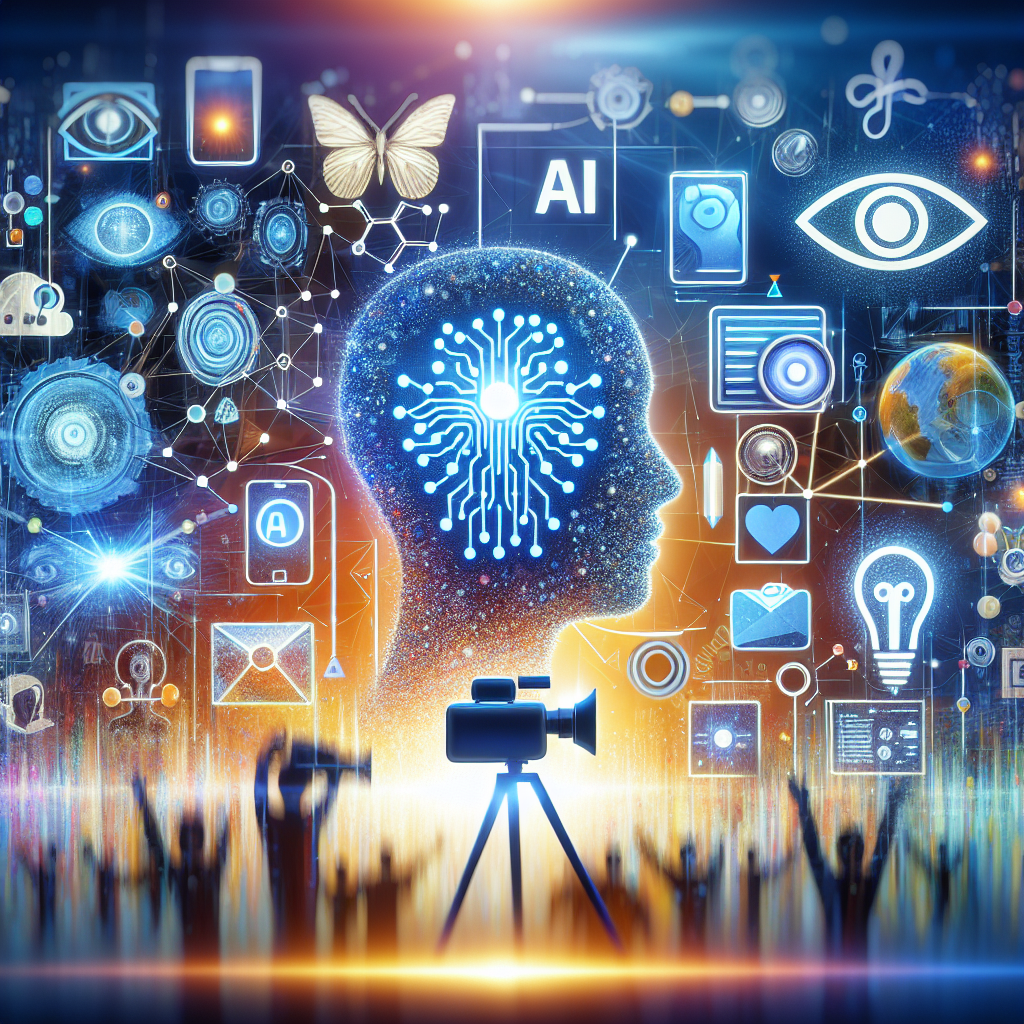Imagine a world where artificial intelligence seamlessly interacts with consumers, crafting personalized brand messaging that leaves a lasting impact. As AI continues to evolve, so does its ability to understand and engage with customers on a deeply individual level. This article explores the dynamic relationship between AI and brand messaging, delving into how this innovative technology is revolutionizing the way companies connect with their target audience, ultimately shaping the future of marketing and consumer engagement. Discover how AI is becoming the driving force behind a new era of creative, compelling and unforgettable brand communication.
AI and Brand Messaging
Artificial Intelligence (AI) is revolutionizing the field of brand messaging, opening up new possibilities and challenges for marketers. By utilizing AI technologies, businesses can enhance their messaging strategies, improve customer engagement, and deliver personalized experiences. However, harnessing the power of AI in brand messaging requires a deep understanding of its capabilities, as well as careful consideration of the potential pitfalls. In this article, we will delve into the role of AI in brand messaging, explore the benefits and challenges it presents, discuss best practices, showcase successful examples, and look ahead to the future of AI in this dynamic field.
Understanding AI
Before we explore the role of AI in brand messaging, it’s important to have a clear understanding of what AI is. Simply put, AI refers to the development of computer systems that can perform tasks that typically require human intelligence. These tasks may include natural language processing, learning, problem-solving, and decision-making. Through machine learning algorithms and data analysis, AI systems can interpret and respond to user inputs, mimic human behavior, and adapt their responses based on patterns and experiences. This ability to analyze vast amounts of data and provide personalized responses makes AI a valuable tool in brand messaging.
The Evolution of Brand Messaging
Brand messaging has come a long way from traditional advertisements and one-size-fits-all marketing campaigns. With the rise of digital technologies and the advent of AI, brands can now engage with their audience in more meaningful ways. The evolution of brand messaging spans from static advertising to interactive experiences, from mass communication to individual interactions, and from generic content to personalized recommendations. AI has played a pivotal role in this transformation, enabling brands to connect with their customers on a deeper level and tailor their messaging to suit individual preferences and needs.
Benefits of AI in Brand Messaging
The integration of AI in brand messaging offers several benefits for both businesses and consumers. Firstly, AI-powered messaging allows for enhanced customer engagement. Chatbots, for instance, can provide immediate responses to customer inquiries, improving overall satisfaction and reducing response times. AI can also analyze customer data to identify patterns and preferences, enabling brands to deliver targeted and personalized messaging. This personalization not only enhances the customer experience but also increases the effectiveness of marketing efforts. Additionally, AI can automate repetitive tasks, freeing up time for marketers to focus on strategy and creativity. The ability of AI to analyze vast amounts of data and provide valuable insights also allows for data-driven decision-making, leading to more effective messaging strategies.
Challenges in AI-driven Brand Messaging
While the benefits of AI in brand messaging are substantial, there are also challenges that need to be addressed. One of the primary challenges is maintaining brand authenticity. AI-powered systems may have limitations in capturing the brand’s unique persona and voice, potentially leading to a loss of authenticity in messaging. It is crucial for marketers to carefully craft and guide AI responses to ensure they align with the brand’s identity. Another challenge is avoiding AI bias. AI systems learn from the data they are fed, and if the data contains biases, it could result in biased messaging. Marketers need to carefully curate the data used to train AI systems and regularly evaluate and monitor their outputs to mitigate bias risks. Finally, privacy and data protection are key concerns in AI-driven brand messaging. Collecting and using customer data for personalized messaging must be done in compliance with privacy regulations and with the utmost respect for user privacy.
Maintaining Brand Authenticity
Maintaining brand authenticity in AI-driven brand messaging is crucial to building and strengthening customer relationships. AI systems can learn from existing brand messaging materials, such as social media posts, website content, and marketing campaigns, to gain insights into the brand’s tone, personality, and values. By feeding this information to the AI algorithms, marketers can guide the system’s responses to ensure they align with the brand’s voice. Regular evaluation and monitoring are essential to ensure that AI-driven messaging accurately reflects the brand’s authenticity and resonates with the target audience.
Avoiding AI Bias
AI systems are only as unbiased as the data they are trained on. To avoid biased messaging, marketers must carefully curate the data used to train AI algorithms. This involves removing any biased or discriminatory content and ensuring a diverse range of inputs are considered. Regular audits and evaluations should be conducted to identify and correct any biases that may emerge. Transparency in AI-driven messaging is also crucial. Consumers should be made aware of the use of AI in brand messaging and given the opportunity to provide feedback and challenge any biases they may perceive.
Privacy and Data Protection
The collection and use of customer data for personalized messaging presents significant privacy concerns. Marketers must ensure that they comply with data protection regulations, such as the General Data Protection Regulation (GDPR) in the European Union, and prioritize user privacy. Clear and transparent communication regarding data usage, consent, and security is essential. Anonymizing and encrypting user data, implementing robust security measures, and regularly reviewing data handling practices are integral to maintaining trust and protecting user information.

Best Practices for AI-driven Brand Messaging
To harness the power of AI in brand messaging effectively, businesses should adhere to several best practices. These practices ensure that AI-driven messaging strategies are aligned with business objectives and deliver meaningful experiences to the target audience.
Setting Clear Objectives
Before implementing AI in brand messaging, it’s crucial to define clear objectives. Whether the goal is to enhance customer engagement, drive conversions, or improve brand perception, setting measurable goals helps guide AI implementation and assess its effectiveness. Objectives should be specific, measurable, attainable, relevant, and time-bound (SMART) to ensure optimal outcomes.
Understanding the Target Audience
To create effective AI-driven brand messaging, businesses need a deep understanding of their target audience. By analyzing customer data, including demographic information, preferences, and behavior patterns, marketers can tailor their messaging to meet specific customer needs. AI algorithms can then utilize this data to personalize messaging, making it more relevant and compelling to the target audience.
Creating Personalized Experiences
Personalization is a key aspect of AI-driven brand messaging. By utilizing AI algorithms, businesses can provide tailored experiences to individual customers. This could involve delivering personalized product recommendations, sending targeted offers, or even creating dynamic website content that adapts to the user’s preferences. Personalization not only increases customer satisfaction and engagement but also boosts conversion rates and customer loyalty.
Ensuring Consistency
While personalization is important, maintaining consistency across AI-driven brand messaging is equally crucial. Consistency ensures that customers experience a coherent and coherent brand identity across different channels and touchpoints. While AI models may have limitations in capturing the nuances of a brand’s personality, establishing guidelines and conducting regular assessments can help align AI-powered messaging with the brand’s tone and voice.
Monitoring and Evaluation
Effective monitoring and evaluation are essential to the success of AI-driven brand messaging. Marketers should regularly assess the performance and impact of AI algorithms in delivering messaging objectives. This involves analyzing data, gathering customer feedback, and conducting A/B testing to optimize AI algorithms and messaging strategies. Continuous monitoring allows for ongoing improvement and adaptation in line with customer preferences and changing market dynamics.
Successful Examples of AI-powered Brand Messaging
Numerous examples showcase the successful integration of AI in brand messaging, demonstrating the potential and effectiveness of this technology.
Chatbots for Customer Engagement
Chatbots have become a common feature of brand messaging, allowing businesses to engage with customers in real-time and provide immediate assistance. Brands like Sephora and Domino’s Pizza have implemented chatbots that offer personalized recommendations, answer customer inquiries, and even complete transactions. These AI-powered chatbots not only enhance customer experience but also streamline operations, reducing the burden on customer service teams.
Personalized Recommendations
E-commerce giants like Amazon have leveraged AI algorithms to deliver highly personalized product recommendations. By analyzing customer browsing and purchase history, as well as data from similar customers, AI-powered recommendation engines can suggest relevant products and services, increasing conversion rates and customer satisfaction. Netflix is another notable example, utilizing AI algorithms to recommend movies and shows based on user preferences, watching history, and ratings.
Virtual Assistants and Voice Search
Virtual assistants, such as Apple’s Siri, Amazon’s Alexa, and Google Assistant, have redefined brand messaging through voice interactions. These AI-powered assistants can answer questions, provide information, and even execute commands, offering a personalized and hands-free experience for users. Brands can optimize their messaging strategies by ensuring their content is voice-search friendly and accessible through these virtual assistants, allowing them to reach their audience in a new and innovative way.

The Future of AI in Brand Messaging
As AI continues to evolve, we can expect further advancements that will shape the future of brand messaging.
Advancements in Natural Language Processing
Natural Language Processing (NLP) holds significant promise for brand messaging. NLP algorithms can understand and generate human language, enabling AI systems to engage in more sophisticated and natural conversations. With improved NLP capabilities, brands can create immersive and personalized messaging experiences that closely mimic human interactions, further enhancing customer engagement and strengthening brand connections.
Integration of AI in Social Media
The integration of AI in social media platforms presents exciting opportunities for brand messaging. AI algorithms can analyze user-generated content and social media conversations to gain insights into customer sentiment, interests, and preferences, allowing brands to craft messaging strategies that resonate with their target audience. AI-powered social media analytics tools can also provide real-time data and actionable insights, enabling marketers to adapt their messaging strategies quickly in response to changing trends and customer feedback.
AI-powered Emotional Intelligence
AI’s ability to interpret human emotions and respond accordingly is an area of ongoing research and development. Emotional intelligence algorithms can analyze facial expressions, tone of voice, and other cues to gauge the emotional state of users. Incorporating emotional intelligence into brand messaging offers opportunities for empathetic and personalized interactions, creating deeper connections with customers. By understanding and responding to customers’ emotions, AI-powered systems can provide support, encouragement, and assistance in a more human-like manner.
In conclusion, AI is revolutionizing brand messaging, offering businesses the ability to deliver personalized, engaging, and meaningful experiences to their customers. By understanding the potential benefits and challenges of AI in brand messaging, and adopting best practices, businesses can harness the power of AI to drive customer engagement, improve brand perception, and create lasting connections. With advancements in AI technology on the horizon, the future of brand messaging holds exciting possibilities for further innovation and growth.
